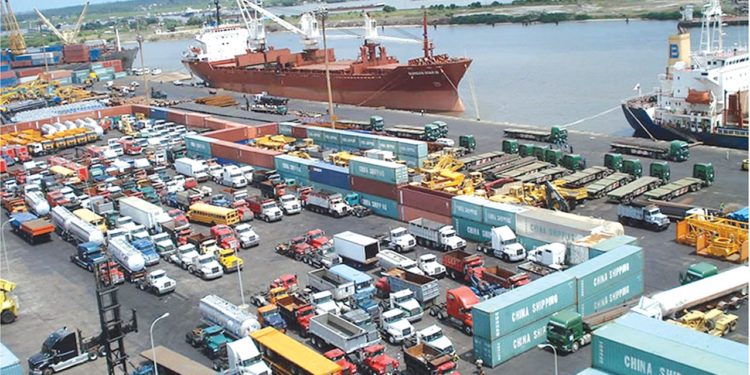Foreign vessels calling at the nation’s seaports have saved a whooping N3.3 billion (equivalent to $6.54 million) as demurrage resulting from delays in vessels clearance in the last 12 months.
Speaking to journalists as part of activities to mark his one year in office, the executive secretary, Nigerian Shippers’ Council (NSC), Emmanuel Jime, said the Nigerian economy would have been losing an average of $20, 000 per day, if not for the proactive strategies of the Council that helped in saving the same between 2020 and 2021.
LEADERSHIP reports that delays in doing business in the nation’s seaport have been leading to payment of billions of naira worth of demurrage by cargo owners to shipping companies, which makes Nigerian port one of the most expensive ports to do business in the region. This is why this development if sustained will bring succor to port users and consumers.
But, according to Jime, the council instituted the mandatory joint boarding and clearing of vessels by government agencies, which helped to reduce the delays shipping liners experience in Nigerian ports, thereby helping to reduce demurrages paid on Nigerian-bound cargoes.
He noted that such action was carried out by the Port Standing Task Team (PSTT) instituted to implement the provisions of the Nigerian Ports Process Manual.
He also assured that the council will ensure that the nation’s seaports are competitive and efficient with Neighboring ports in West, central Africa.
He said, “On joint vessel boarding by mandated government agencies, the activities of the team saved the Nigerian economy an average vessel demurrage of $20, 000 per day between year 2020 and 2021, which ultimately translates to the sum of $6.5m (N3.3billion). Likewise, the average time for resolving complaints with regards to vessel infractions has also considerably reduced from 7-10 days to 1 – 4 hours.”
“Be rest assured that the Council is not resting on her oars to deliver on her mandate and ensure that Nigerian Ports are competitive when compared with neighbouring ports in the West African Sub-Region. “
“This could only be achieved and sustained through effective collaboration with critical stakeholders in the industry.”
Jime further said that the Council has been able to reduce the average time for resolving complaints lodged by ship owners with regards to vessel infractions from seven to 10 days to between 1 to 4 hours.
On the compliance with the Joint Cargo Examination by all government agencies involved in cargo clearance, which is another function of PSTT, Jime said the exercise has helped to increase the number of cargoes examined per day from 125 container boxes per terminal to an average of 230 container boxes daily.
“The implementation of the Port Manual has facilitated the ease of doing business in our ports and has drastically reduced corruption tendencies,” he added.
“More than 85 per cent of vessels that called at Nigerian Ports in 2021 left without any incident, which was not the case in time past. On the other hand as regards Compliance with Joint Cargo Examination by all government agencies involved in cargo clearance, the exercise has helped to increase the number of cargos examined per day from 125 to an average of 230 boxes daily per terminal.
“In summary, the implementation of the manual, has facilitated the ease of doing business in our ports and it has drastically reduced corruption tendencies. It has alsoled to collaboration with Nigerian Export Promotion Council (NEPC) on the establishment and operation of Domestic Export Warehouses.
“A total of 12 Domestic Export Warehouses nationwide have been approved for commencement of operations. Some of the facilities granted approval to begin operations included; GEZEWA Commodity Exchange in Kano; MV EHILOMEL , Onne in Rivers State; ESSLIBRA in Ikorodu-Lagos State; Harris Logistics in Lokoja-Kogi State; Sealink Limited in Ajaokuta – Kogi State; Kaduna Inland Dry Port in Kaduna State and AMES-Edo Inland dry Port in Benin-Edo State.”
On complaints handling and resolution, the NSC boss said in 2021, the council received and handled 518 complaints from cargo owners and another 100 complaints in the first quarter of 2022.
“The council in 2021 received and handled 518 complaints, while in first quarter of 2022, 100 complaints were received and handled. The Council in 2021 was able to recover the sum of N1.07billion while in the first quarter of 2022, stakeholders were saved of the sum of N18.5million. The council is currently working on compilation and analysis of complaints handled in the second quarter of year 2022,” Jime said.



